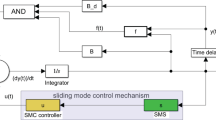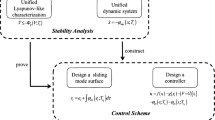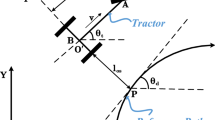Abstract
Fault-tolerant control (FTC) of a non-affine system with uncertainties is one of critical issues in nonlinear control. In this paper, in the presence of unknown actuator failures, an event-trigger-based FTC scheme is proposed for such a nonlinear system with predefined performance. For actuator failures, a compensation mechanism is designed to alleviate their impacts. By utilizing a predefined performance function, higher tracking accuracy can be obtained. Meanwhile, an event-triggered mechanism with a time-varying threshold, depending on tracking error, reduces the number of communications for a controller-to-actuator channel. An adaptive event-triggered function is then proposed with the compensation mechanism to improve the self-adjusting ability of the triggered function. Also, extended state observers and tracking differentiators are utilized to reconstruct unknown dynamics of the system and to simplify high-order derivation of virtual control laws, respectively. The stability of the closed-loop system is analyzed by input-to-state practically stability. Finally, two simulation results are supplied to verify the effectiveness of the proposed control method.
Similar content being viewed by others
References
Y. Yang, Y. Xiao, and T. Li, “A survey of autonomous underwater vehicle formation: Performance, formation control, and communication capability,” IEEE Communications Surveys & Tutorials, vol. 23, no. 2, pp. 815–841, 2021.
X. Bu, “Air-breathing hypersonic vehicles funnel control using neural approximation of non-affine dynamics,” IEEE/ASME Transactions on Mechatronics, vol. 23, no. 5, pp. 2099–2108, 2018.
T. Li, W. Bai, Q. Liu, Y. Long, and C. Chen, “Distributed fault-tolerant containment control protocols for the discrete-time multiagent systems via reinforcement learning method,” IEEE Transactions on Neural Networks and Learning Systems, pp. 1–13, 2021, DOI: https://doi.org/10.1109/TNNLS.2021.3121403
H. Ma, H. Li, H. Liang, and G. Dong, “Adaptive fuzzy event-triggered control for stochastic nonlinear systems with full state constraints and actuator faults,” IEEE Transactions on Fuzzy Systems, vol. 27, no. 11, pp. 2242–2254, 2019.
Y. Liang, H. Zhang, J. Duan, and S. Sun, “Event-triggered reinforcement learning H∞ control design for constrained-input nonlinear systems subject to actuator failures,” Information Sciences, vol. 543, pp. 273–295, 2021.
D. Ye, M. Chen, and H. Yang, “Distributed adaptive event-triggered fault-tolerant consensus of multiagent systems with general linear dynamics,” IEEE Transactions on Cybernetics, vol. 49, no. 3, pp. 757–767, 2019.
Z. Li, J. Dong, and C. Xi, “Event-triggered adaptive reliable guaranteed performance control for uncertain nonlinear systems with abrupt non-affine faults,” Applied Mathematics and Computation, vol. 380, pp. 1–14, 2020.
C. Zhu, C. Li, X. Chen, K. Zhang, X. Xin, and H. Wei, “Event-triggered adaptive fault tolerant control for a class of uncertain nonlinear systems,” Entropy, vol. 9, no. 2, pp. 235–245, 2022.
X. Shao and D. Ye, “Fuzzy adaptive event-triggered secure control for stochastic nonlinear high-order mass subject to DoS attacks and actuator faults,” IEEE Transactions on Fuzzy Systems, vol. 29, no. 12, pp. 3812–3821, 2021.
K. Lu, Z. Liu, and Y. Zhang, “Event-triggered neural control of nonlinear systems with rate-dependent hysteresis input based on a new filter,” IEEE Transactions on Neural Networks and Learning Systems, vol. 31, no. 4, pp. 1270–1284, 2020.
C. Wang and L. Guo, “Adaptive compensation for infinite number of actuator failures with an application to flight control,” International Journal of Adaptive Control and Signal Processing, vol. 30, no. 3, pp. 443–455, 2016.
J. Wang, Z. Liu, C. Chen, and Y. Zhang, “Fuzzy adaptive compensation control of uncertain stochastic nonlinear systems with actuator failures and input hysteresis,” IEEE Transactions on Cybernetics, vol. 49, no. 1, pp. 2–13, 2019.
G. Lai, C. Wen, Z. Liu, Y. Zhang, C. Chen, and S. Xie, “Adaptive compensation for infinite number of actuator failures/faults using output feedback control,” Information Sciences, vol. 399, pp. 1–12, 2017.
G. Lai, Z. Liu, C. Chen, Y. Zhang, and X. Chen, “Adaptive compensation for infinite number of time-varying actuator failures in fuzzy tracking control of uncertain nonlinear systems,” IEEE Transactions on Fuzzy Systems, vol. 26, no. 2, pp. 474–486, 2018.
J. Han, “From PID to active disturbance rejection control,” IEEE Transactions on Industrial Electronics, vol. 56, no. 3, pp. 900–906, 2009.
B. Guo and Z. Zhao, “On convergence of the nonlinear active disturbance rejection control for MIMO systems,” SIAM Journal on Control and Optimization, vol. 51, no. 2, pp. 1727–1757, 2013.
B. Guo and Z. Zhao, “On the convergence of an extended state observer for nonlinear systems with uncertainty,” Systems & Control Letters, vol. 60, no. 6, pp. 420–430, 2011.
Z. Zhao and B. Guo, “On active disturbance rejection control for nonlinear systems using time-varying gain,” European Journal of Control, vol. 23, pp. 62–70, 2015.
B. Guo, Z. Wu, and H. Zhou, “Active disturbance rejection control approach to output-feedback stabilization of a class of uncertain nonlinear systems subject to stochastic disturbance,” IEEE Transactions on Automatic Control, vol. 61, no. 6, pp. 1613–1618, 2016.
X. Ma, Y. Guo, and L. Chen, “Active disturbance rejection control for electric power steering system with assist motor variable mode,” Journal of the Franklin Institute, vol. 355, no. 3, pp. 1139–1155, 2018.
Z. Chu, Y. Sun, C. Wu, and N. Sepehri, “Active disturbance rejection control applied to automated steering for lane keeping in autonomous vehicles,” Control Engineering Practice, vol. 74, pp. 13–21, 2018.
N. Zhang, W. Gai, G. Zhang, and J. Zhang, “An active disturbance rejection control guidance law based collision avoidance for unmanned aerial vehicles,” Aerospace Science and Technology, vol. 77, pp. 658–669, 2018.
Z. Jun, Y. Cheng, H. Du, D. Wu, M. Zhu, and X. Lin, “Active finite-time disturbance rejection control for attitude tracking of quad-rotor under input saturation,” Journal of the Franklin Institute, vol. 357, no. 16, pp. 11153–11170, 2020.
Y. Xu, S. Tong, and Y. Li, “Prescribed performance fuzzy adaptive fault-tolerant control of non-linear systems with actuator faults,” IET Control Theory & Applications, vol. 8, no. 6, pp. 420–431, 2014.
W. Wang, D. Wang, Z. Peng, and T. Li, “Prescribed performance consensus of uncertain nonlinear strict-feedback systems with unknown control directions,” IEEE Transactions on Systems, Man, and Cybernetics: Systems, vol. 46, no. 9, pp. 1279–1286, 2016.
X. Wang, X. Yin, and F. Shen, “Disturbance observer based adaptive neural prescribed performance control for a class of uncertain nonlinear systems with unknown backlashlike hysteresis,” Neurocomputing, vol. 299, pp. 10–19, 2018.
J. Zhang and G. Yang, “Fuzzy adaptive output feedback control of uncertain nonlinear systems with prescribed performance,” IEEE Transactions on Cybernetics, vol. 48, no. 5, pp. 1342–1354, 2018.
K. Zhao, Y. Song, and Y. Wang, “Regular error feedback based adaptive practical prescribed time tracking control of normal-form nonaffine systems,” Journal of the Franklin Institute, vol. 356, no. 5, pp. 2759–2779, 2019.
Y. Yang, J. Tan, and D. Yue, “Prescribed performance tracking control of a class of uncertain pure-feedback nonlinear systems with input saturation,” IEEE Transactions on Systems, Man, and Cybernetics: Systems, vol. 50, no. 5, pp. 1733–1745, 2020.
X. Wang and M. Lemmon, “Event-triggering in distributed networked control systems,” IEEE Transactions on Automatic Control, vol. 56, no. 3, pp. 586–601, 2011.
D. Dimarogonas, E. Frazzoli, and K. Johansson, “Distributed event-triggered control for multi-agent systems,” IEEE Transactions on Automatic Control, vol. 57, no. 5, pp. 1291–1297, 2012.
C. Wang, C. Wen, and Y. Lin, “Decentralized adaptive backstepping control for a class of interconnected nonlinear systems with unknown actuator failures,” Journal of the Franklin Institute, vol. 352, no. 3, pp. 835–850, 2015.
C. Wang, C. Wen, and Y. Lin, “Adaptive actuator failure compensation for a class of nonlinear systems with unknown control direction,” IEEE Transactions on Automatic Control, vol. 62, no. 1, pp. 385–392, 2016.
Y. Choi and S. Yoo, “Event-triggered decentralized adaptive fault-tolerant control of uncertain interconnected nonlinear systems with actuator failures,” ISA Transactions, vol. 77, pp. 77–89, 2018.
L. Xing, C. Wen, Z. Liu, H. Su, and J. Cai, “Adaptive compensation for actuator failures with event-triggered input,” Automatica, vol. 85, pp. 129–136, 2017.
Y. Li and G. Yang, “Adaptive neural control of pure-feedback nonlinear systems with event-triggered communications,” IEEE Transactions on Neural Networks and Learning Systems, vol. 29, no. 12, pp. 6242–6251, 2018.
X. Yang and H. He, “Adaptive critic designs for event-triggered robust control of nonlinear systems with unknown dynamics,” IEEE Transactions on Cybernetics, vol. 49, no. 6, pp. 2255–2267, 2018.
C. Zhang and G. Yang, “Event-triggered adaptive output feedback control for a class of uncertain nonlinear systems with actuator failures,” IEEE Transactions on Cybernetics, vol. 50, no. 1, pp. 201–210, 2018.
L. Xing, C. Wen, Z. Liu, H. Su, and J. Cai, “Event-triggered output feedback control for a class of uncertain nonlinear systems,” IEEE Transactions on Automatic Control, vol. 64, no. 1, pp. 290–297, 2018.
L. Wang, M. Basin, H. Li, and R. Lu, “Observer-based composite adaptive fuzzy control for nonstrict-feedback systems with actuator failures,” IEEE Transactions on Fuzzy Systems, vol. 26, no. 4, pp. 2336–2347, 2018.
H. Pan, H. Li, W. Sun, and Z. Wang, “Adaptive fault-tolerant compensation control and its application to nonlinear suspension systems,” IEEE Transactions on Systems, Man, and Cybernetics: Systems, vol. 50, no. 5, pp. 1766–1776, 2020.
Y. Liu and W. Wang, “Adaptive fuzzy control for a class of uncertain nonaffine nonlinear systems,” Information Sciences, vol. 177, no. 18, pp. 3901–3917, 2007.
M. Wang, X. Liu, and P. Shi, “Adaptive neural control of pure-feedback nonlinear time-delay systems via dynamic surface technique,” IEEE Transactions on Systems, Man, and Cybernetics, Part B (Cybernetics), vol. 41, no. 6, pp. 1681–1692, 2011.
W. Zhang and W. Wei, “Disturbance-observer-based finite-time adaptive fuzzy control for non-triangular switched nonlinear systems with input saturation,” Information Sciences, vol. 561, pp. 152–167, 2021.
Z. Li, J. Dong, and C. Xi, “Event-triggered adaptive reliable guaranteed performance control for uncertain nonlinear systems with abrupt non-affine faults,” Applied Mathematics and Computation, vol. 380, 125256, 2020.
J. Yu, P. Shi, and L. Zhao, “Finite-time command filtered backstepping control for a class of nonlinear systems,” Automatica, vol. 92, pp. 173–180, 2018.
J. Yu, P. Shi, W. Dong, and C. Lin, “Adaptive fuzzy control of nonlinear systems with unknown dead zones based on command filtering,” IEEE Transactions on Fuzzy Systems, vol. 26, no. 1, pp. 46–55, 2016.
M. Chen, H. Wang, X. Liu, T. Hayat, and F. Alsaadi, “Adaptive finite-time dynamic surface tracking control of nonaffine nonlinear systems with dead zone,” Neurocomputing, vol. 366, pp. 66–73, 2019.
D. Swaroop, J. Hedrick, P. Yip, and J. Gerdes, “Dynamic surface control for a class of nonlinear systems,” IEEE Transactions on Automatic Control, vol. 45, no. 10, pp. 1893–1899, 2000.
C. Ren, Y. Ding, and S. Ma, “A structure-improved extended state observer based control with application to an omnidirectional mobile robot,” ISA Transactions, vol. 101, pp. 335–345, 2020.
S. Diao, W. Sun, and S. Su, “Neural-based adaptive event-triggered tracking control for flexible-joint robots with random noises,” International Journal of Robust and Nonlinear Control, vol. 32, no. 5, pp. 2722–2740, 2022.
S. Diao, W. Sun, S. Su, and J. Xia, “Adaptive fuzzy event-triggered control for single-link flexible-joint robots with actuator failures,” IEEE Transactions on Cybernetics, vol. 52, no. 8, pp. 7231–7241, 2022.
Y. Li, F. Qu, and S. Tong, “Observer-based fuzzy adaptive finite-time containment control of nonlinear multiagent systems with input delay,” IEEE Transactions on Cybernetics, vol. 51, no. 1, pp. 126–137, 2020.
Y. Li, X. Shao, and S. Tong, “Adaptive fuzzy prescribed performance control of nontriangular structure nonlinear systems,” IEEE Transactions on Fuzzy Systems, vol. 28, no. 10, pp. 2416–2426, 2019.
Y. Yang, X. Si, and D. Yue, “Trigger-based tracking control for a class of uncertain nonlinear systems via an event-triggered extended state observer,” International Journal of Robust and Nonlinear Control, vol. 31, no. 1, pp. 287–305, 2021.
A. González, A. Cuenca, V. Balaguer, and P. García, “Event-triggered predictor-based control with gain-scheduling and extended state observer for networked control systems,” Information Sciences, vol. 491, pp. 90–108, 2019.
L. Liu, W. Zhang, D. Wang, and Z. Peng, “Event-triggered extended state observers design for dynamic positioning vessels subject to unknown sea loads,” Ocean Engineering, vol. 209, 107242, 2020.
D. Ran, X. Chen, A. Ruiter, and B. Xiao, “Adaptive extended-state observer-based fault tolerant attitude control for spacecraft with reaction wheels,” Acta Astronautica, vol. 145, pp. 501–514, 2018.
B. Li, K. Qin, B. Xiao, and Y. Yang, “Finite-time extended state observer based fault tolerant output feedback control for attitude stabilization,” ISA Transactions, vol. 91, pp. 11–20, 2019.
Y. Huang and J. Han, “Analysis and design for the second order nonlinear continuous extended states observer,” Chinese Science Bulletin, vol. 45, no. 21, pp. 1938–1944, 2000.
J. Han, Active Disturbance Rejection Control Technique-The Technique for Estimating and Compensating the Uncertainties, National Defense Industry Press, Beijing, 2008.
B. Guo and Z. Zhao, “Weak convergence of nonlinear high-gain racking differentiator,” IEEE Transactions on Automatic Control, vol. 58, no. 4, pp. 1074–1080, 2013.
E. Sontag, “Further results about input-state stabilization,” IEEE Transactions on Automatic Control, vol. 35, no. 4, pp. 473–476, 1990.
E. Sontag, “On the input-to-state stability property,” European Journal of Control, vol. 1, no. 1, pp. 24–36, 1995.
J. Ma, Z. Zheng, and P. Li, “Adaptive dynamic surface control of a class of nonlinear systems with unknown direction control gains and input saturation,” IEEE Transactions on Cybernetics, vol. 45, no. 4, pp. 728–741, 2014.
Z. Shen, Y. Bi, Y. Wang, and C. Guo, “MLP neural network-based recursive sliding mode dynamic surface control for trajectory tracking of fully actuated surface vessel subject to unknown dynamics and input saturation,” Neurocomputing, vol. 377, pp. 103–112, 2020.
C. Chen, Y. Hu, and J. Wu, “Active disturbance rejection control for non-affine pure feedback nonlinear systems,” Acta Automatica Sinica, vol. 40, no. 7, pp. 1528–1536, 2014.
Y. Li, Y. Liu, and S. Tong, “Observer-based neuro-adaptive optimized control of strict-feedback nonlinear systems with state constraints,” IEEE Transactions on Neural Networks and Learning Systems, vol. 33, no. 7, pp. 3131–3145, 2022.
L. Xing, C. Wen, Z. Liu, H. Su, and J. Cai, “Adaptive compensation for actuator failures with event-triggered input,” Automatica, vol. 85, pp. 129–136, 2017.
J. Chen, S. Hara, and G. Chen, “Best tracking and regulation performance under control energy constraint,” IEEE Transactions on Automatic Control, vol. 48, no. 8, pp. 1320–1336, 2003.
T. Shen, Robot Robust Control Foundation, Tsinghua University Press, Beijing, 2000.
Author information
Authors and Affiliations
Corresponding author
Additional information
Publisher’s Note Springer Nature remains neutral with regard to jurisdictional claims in published maps and institutional affiliations.
This work was supported in part by National Natural Science Foundation of China under Grant 61873130, in part by Natural Science Foundation of Jiangsu Province under Grant BK20191377, in part by Key projects of Natural Science Foundation of Hebei Province under Grant E2020203139, in part by the 1311 Talent Project of Nanjing University of Posts and Telecommunications, in part by Natural Science Foundation of Nanjing University of Posts and Telecommunications under Grant NY220194, NY221082 and NY222144, and in part by the foundation from Key Laboratory of Industrial Internet of Things and Networked Control of the Ministry of Education of China under Grant 2021FF01.
Yang Yang received his B.E., M.E., and Ph.D. degrees in automatic control from Dalian Maritime University, Dalian, China, in 2008, 2010, and 2013, respectively. From 2018 to 2019, he held a visiting research fellow position at the School of Electrical Engineering and Computer Science, Queensland University of Technology, Brisbane QLD, Australia. He is currently an Associate Professor with the College of Automation & College of Artificial Intelligence, Nanjing University of Posts and Telecommunications (NJUPT), Nanjing, China. His research interests include nonlinear control theory and intelligent control. Dr. Yang was a recipient of the National Scholarship for Ph.D. candidates, the HOSCO Special Award, the Jiangsu Government Scholarship for Overseas Studies, the IET CSR Best Paper Award of 2019 Chinese Automation Congress, the Excellent Postdoctoral Research Fellow Award of NJUPT, and the 1311 Talent Project at NJUPT. He serves as a reviewer for various peer-reviewed journals.
Yuwei Zhang is currently pursuing her master’s degree in control theory and control engineering at Nanjing University of Posts and Telecommunications, Nanjing, China. Her current research interests include nonlinear control theory.
Zijin Wang is currently pursuing a master’s degree in control theory and control engineering at Nanjing University of Posts and Telecommunications, Nanjing, China. His current research interests include nonlinear control theory.
Jinran Wu is pursuing a Ph.D. degree in statistics at the School of Mathematical Sciences and the ARC Centre of Excellence for Mathematical & Statistical Frontiers, Queensland University of Technology, Brisbane QLD, Australia. He was awarded his bachelor’s degree from Anhui University, China in 2014, and his master’s degree from Lanzhou University, China in 2017. He is interested in the robust statistical learning and engineering optimisations. He was awarded the Australian Government Research Training Program (RTP) Stipend (International), 2018.
Xuefeng Si is currently pursuing a master’s degree in control theory and control engineering at Nanjing University of Posts and Telecommunications, Nanjing, China. His current research interests include smart grid control.
Rights and permissions
About this article
Cite this article
Yang, Y., Zhang, Y., Wang, Z. et al. Event-trigger-based Fault-tolerant Control of Uncertain Non-affine Systems with Predefined Performance. Int. J. Control Autom. Syst. 21, 519–535 (2023). https://doi.org/10.1007/s12555-021-1007-y
Received:
Revised:
Accepted:
Published:
Issue Date:
DOI: https://doi.org/10.1007/s12555-021-1007-y




